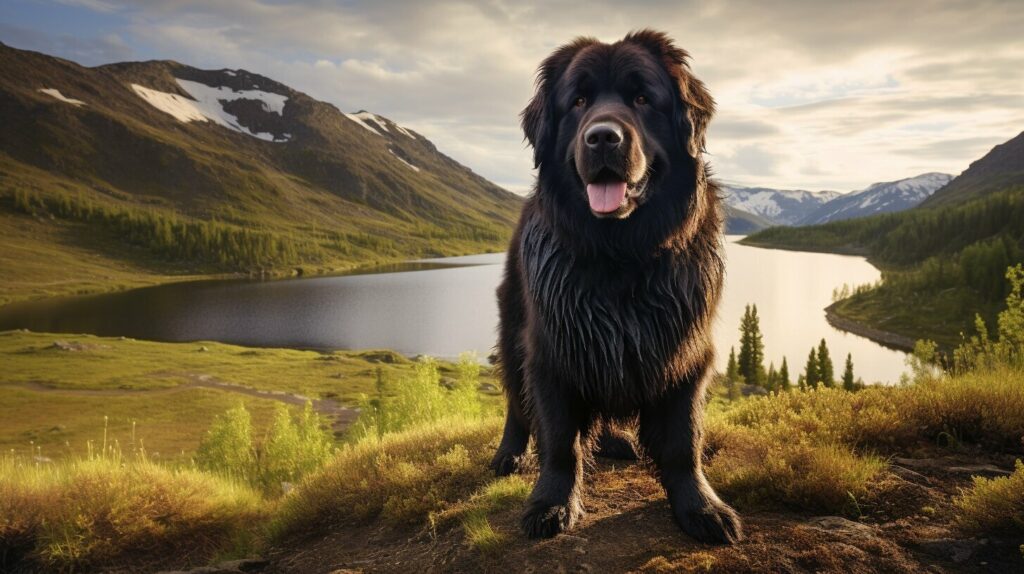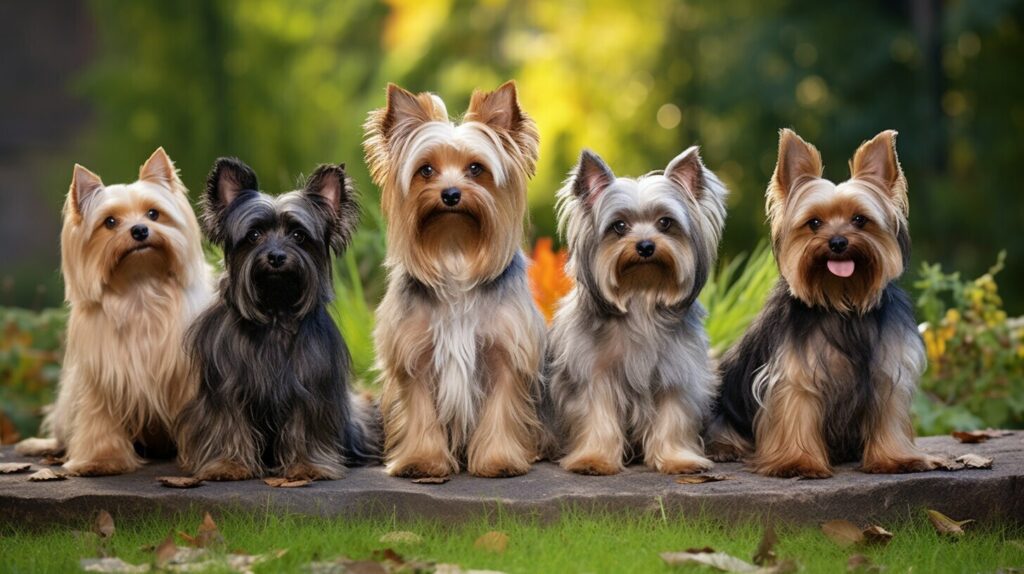If you’re looking for a loyal and affectionate companion, look no further than the Newfoundland dog breed. These gentle giants are known for their strength, intelligence, and loving nature. In this comprehensive guide, you’ll uncover everything you need to know about this remarkable breed.
Key Takeaways:
- Newfoundland dogs are a breed known for their loyalty and gentle nature.
- They are a large breed, with a muscular build and a thick, water-resistant coat.
- Newfoundland dogs have a rich history as working dogs in Newfoundland, Canada.
- Proper care, training, and socialization are important for the overall well-being of a Newfoundland dog.
- When searching for a reputable breeder, it’s important to conduct proper research and evaluate the quality of the breeding program.
Understanding the Newfoundland Dog Breed
The Newfoundland dog breed is one of the oldest and most beloved breeds in the world. Originally bred in Newfoundland, Canada, they were used for various tasks such as water rescue and draft work.
| Newfoundland Dog Breed Characteristics | Newfoundland Dog Breed Characteristics |
|---|---|
| Size: Males – 28 inches at the shoulder, Females – 26 inches at the shoulder | Coat: Double coat that is water-resistant. Colors include black, brown, gray, and white with black markings. |
| Weight: Males – 130-150 pounds, Females – 100-120 pounds | Temperament: Gentle, loyal, and friendly. Known for their patient and calm demeanor, especially with children. |
| Lifespan: 8-10 years | Trainability: Intelligent and willing to please. Respond well to positive reinforcement training techniques. |
The Newfoundland dog breed is known for its impressive size and muscular build. They have a thick, double coat that helps them stay warm in cold water and harsh weather conditions. They come in a variety of colors, but the most common are black, brown, and gray.
Their gentle and friendly temperament makes them great family pets. They are known for their love of children and their patient and calm demeanor. They are intelligent and respond well to positive reinforcement training techniques.
Overall, the Newfoundland dog breed is a loyal and reliable companion. Their unique characteristics and history make them a fascinating breed to learn about and a joy to have as a pet.
Training Your Newfoundland Dog
Newfoundland dogs are intelligent and willing to please, making them great candidates for training. However, early socialization and consistent, positive reinforcement are key to ensuring success in training.
The following tips can help you train your Newfoundland dog:
- Start early: Begin training your dog as soon as possible, ideally when they are still puppies. Early training is essential to prevent unwanted behaviors from developing.
- Be positive: Positive reinforcement techniques, such as treats and praise, work best with Newfoundland dogs. Harsh or punitive methods are not recommended and can damage the bond between you and your pet.
- Focus on socialization: Introducing your Newfoundland dog to new people, animals, and environments from an early age can help prevent shyness or aggression in social situations.
- Use obedience commands: Teaching your dog basic obedience commands, such as “sit,” “stay,” and “come,” can improve communication and build trust between you and your pet.
- Keep it fun: Newfoundland dogs love to play and have fun. Incorporating games and interactive training into your routine can help keep your dog engaged and interested in learning.
In addition to these training tips, it’s important to remember that consistency and patience are essential to effectively train your Newfoundland dog. With proper training and socialization, your furry friend can become a well-behaved and well-adjusted member of your family.
Taking Care of Your Newfoundland Dog
Newfoundland dogs are renowned for their thick double coat, which requires regular grooming to maintain its health and quality. Here are some essential tips for caring for your Newfoundland dog:
| Aspect of Care | Description |
|---|---|
| Grooming | The thick double coat of a Newfoundland dog requires regular brushing to prevent matting and tangling. You should also trim their nails regularly and clean their ears to avoid infections. |
| Exercise | Newfoundland dogs are large and muscular, so regular exercise is essential for their physical and mental well-being. Daily walks and playtime can help keep them healthy and happy. |
| Nutrition | A balanced and nutritious diet is essential for the health of your Newfoundland dog. You should choose high-quality dog food and avoid overfeeding to maintain a healthy weight. |
| Healthcare | Regular veterinary check-ups are crucial for detecting and treating any health issues in your Newfoundland dog. You should also ensure they receive all necessary vaccinations and preventative care, such as heartworm medication. |
Common health issues in Newfoundland dogs include hip dysplasia, which can be addressed with regular exercise and proper nutrition. Additionally, they may develop ear infections or hot spots in their double coat. Regular check-ups and grooming can help prevent and treat these issues.
Overall, caring for your Newfoundland dog requires attention and regular maintenance, but the rewards of having a happy and healthy companion are well worth the effort.
Welcoming a Newfoundland Puppy into Your Home
Bringing home a new puppy is an exciting experience, especially if you have opted for a Newfoundland. These gentle giants are known for their loving personalities, intelligence, and loyalty. Here are some tips on how to prepare for your new furry friend:
Find a reputable breeder
When looking for a Newfoundland puppy, it is essential to find a reputable breeder. This will ensure your puppy comes from a healthy and well-cared for bloodline. Research potential breeders thoroughly and ask for referrals from other Newfoundland owners. A good breeder will provide you with health records and clearances, as well as provide support throughout your puppy’s life.
Prepare your home
Before bringing your puppy home, you’ll need to make necessary arrangements. Newfoundland puppies grow quickly, so ensure you have enough space for them to move around. Secure your backyard and home to prevent any accidents or injuries. Prepare a space for your puppy to sleep and rest, and have all necessary supplies ready such as food, toys, and bedding.
Puppy care and training
Start training and socializing your puppy from an early age. Newfoundland puppies respond well to positive reinforcement training, so be sure to use treats and praise to reward good behavior. Start with basic commands such as sit, stay, and come, and gradually work your way up to more advanced skills. Early socialization with other dogs and people is crucial for a well-adjusted and friendly adult.
Remember that Newfoundland puppies require a lot of attention and exercise, so be prepared to devote time and effort. With patience, consistency, and plenty of love, your Newfoundland puppy will grow up to be a loyal and beloved companion.
Exploring the History of Newfoundland Dogs
The history of the Newfoundland dog breed is rich and fascinating. Originating from the Canadian island province of Newfoundland, these dogs were originally bred by fishermen to help with their work.
The Newfoundland dog’s history goes back to the 1700s, where they were used for various tasks such as hauling carts, guarding the home, and as water rescue dogs. Their webbed feet, impressive strength, and swimming abilities made them indispensable for fishermen, as they were able to help retrieve fishing nets and lost gear.
The breed’s physical attributes and temperament also made them ideal for water rescue. Newfoundland dogs were used to save people stranded at sea, with some even credited with rescuing drowning individuals and children from icy waters.
During the 19th century, the breed’s popularity spread beyond Canada, and they became sought after in Europe and America. They were used as show dogs and became popular with the wealthy as pets. Newfoundland dogs have also played a role in various historical events such as accompanying Lewis and Clark on their expedition.
The Newfoundland dog has served as a working dog for centuries, and their contributions have been invaluable. Today, they are still used for water rescue and have also become beloved pets and loyal companions. Understanding their history sheds light on their characteristics and the reasons they are beloved to this day.
Finding Reputable Newfoundland Dog Breeders
If you’re considering bringing a Newfoundland dog into your home, it’s essential to find a reputable breeder. A responsible breeder will ensure that their dogs are healthy, well-cared for, and have the best possible chance of a happy and fulfilling life in their new home. Here are some essential tips for finding reputable Newfoundland dog breeders:
- Do your research: Start by researching breeders in your area. Look for breeders who are members of reputable dog breeding clubs and organizations. These groups often have strict guidelines and ethical standards that breeders must follow, which can help ensure that your new puppy is healthy and well-cared for.
- Ask for referrals: Reach out to other Newfoundland dog owners and ask for referrals. Word of mouth is an excellent way to find reputable breeders who have a proven track record of producing healthy, happy puppies.
- Check for health clearances: A responsible breeder will have health clearances for their dogs. These clearances are issued by a veterinarian and show that the dog has been screened for any hereditary health issues. Be sure to ask the breeder about the health clearances for the parents of your potential puppy.
- Visit the breeder: Before committing to a breeder, visit their facility. Look for clean and well-maintained living conditions for the dogs. Observe the dogs’ behavior and temperament to ensure they are relaxed, happy, and well-socialized.
- Ask questions: Don’t hesitate to ask the breeder questions about their breeding program. A reputable breeder will be happy to answer your questions and provide you with any information you need to make an informed decision.
By following these tips, you can find a reputable Newfoundland dog breeder who will provide you with a healthy, happy puppy to join your family for years to come.
Understanding the Temperament of Newfoundland Dogs
Newfoundland dogs are known for their friendly and gentle temperament, making them excellent family pets and companions. Their calm and patient demeanor makes them a perfect fit for families with children, as they possess great love and tolerance for them.
These dogs are also known to be loyal and protective, making them great watch dogs and guard dogs. However, their protectiveness should not be mistaken for aggression, as they are naturally gentle and good-natured.
Newfoundland dogs are highly adaptable to different environments. They thrive in both indoor and outdoor settings and enjoy playing and exercising with their owners. They are also great swimmers with their webbed feet and powerful strokes, making them natural water rescuers.
In summary, the temperament of Newfoundland dogs is what sets them apart from other breeds. They are gentle, patient, adaptable, and loyal, making them great companions for families with children and outdoor enthusiasts.
The Size and Physical Characteristics of Newfoundland Dogs
Newfoundland dogs are among the biggest breeds in the world, with males weighing anywhere from 130 to 150 pounds and reaching a height of up to 30 inches at the shoulder. Females are slightly smaller, weighing between 100 to 120 pounds and standing as tall as 27 inches.
One of the most notable physical features of the Newfoundland dog is their thick double coat. This water-resistant coat protects them in harsh weather conditions and is made up of a soft undercoat and longer outer coat. Their coat can come in various colors, including black, brown, gray, and white with black markings.
Their large, muscular build gives them impressive strength and endurance. They are often used for water rescue and have webbed feet that enable them to swim with ease.
Newfoundland dogs are known for their gentle and calm temperament. They are devoted to their families and have a reputation for being excellent with children. Their patient and laid-back nature makes them adaptable to different living situations, whether it’s a small apartment or a spacious home with a yard.
Training and Exercise Requirements
Despite their size, Newfoundland dogs are not overly active and require only moderate exercise. Daily walks and playtime in the yard are usually enough to keep them happy and healthy. They also enjoy swimming, so taking them to a nearby lake or beach can be a great way to provide them with stimulation and exercise.
Training a Newfoundland dog can be challenging, but they are generally eager to please their owners and respond well to positive reinforcement methods. Early socialization and obedience training are essential to ensure they grow into well-behaved and obedient dogs. Housebreaking can also take longer due to their slower maturation period.
In conclusion, Newfoundland dogs are remarkable animals with impressive size, strength, and endurance. Their water-resistant double coat, webbed feet, and gentle temperament make them great pets for families, while their adaptability and moderate exercise requirements also make them suitable for different living situations.
Conclusion
Congratulations on completing our comprehensive guide to Newfoundland dogs! You now have a better understanding of the history, characteristics, temperament, and care requirements of this remarkable breed.
As we’ve discussed, Newfoundland dogs are known for their gentle nature, loyalty, and strength. They make wonderful pets and companions for families, individuals, and even those in search and rescue efforts.
If you’re considering bringing a Newfoundland puppy into your home, be sure to research reputable breeders and provide proper care and training. Remember to socialize and train your dog from an early age, and maintain a consistent grooming and exercise routine.
Thank you for taking the time to learn about these incredible dogs. We hope that our guide has brought you closer to uncovering the charm of Newfoundland dogs!
FAQ
Q: What are the main characteristics of Newfoundland dogs?
A: Newfoundland dogs are known for their large size, gentle nature, and impressive strength. They have a thick double coat that is water-resistant and come in various colors. They are also known for their webbed feet, which make them excellent swimmers.
Q: Are Newfoundland dogs good with children?
A: Yes, Newfoundland dogs are known for being great with children. They are gentle and patient, making them ideal family pets. However, as with any interaction between dogs and children, supervision is always recommended.
Q: How do I train a Newfoundland dog?
A: Training a Newfoundland dog requires patience and consistency. Socialization from a young age is important to ensure they are comfortable around people and other animals. Positive reinforcement techniques, such as rewards and praise, work well due to their willingness to please.
Q: How often should I groom my Newfoundland dog?
A: Newfoundland dogs have a thick double coat that requires regular brushing to prevent matting. They shed moderately throughout the year but experience heavier shedding during seasonal changes. Regular grooming, including nail trimming and ear cleaning, is also necessary.
Q: Are Newfoundland dogs prone to any health issues?
A: While generally healthy, Newfoundland dogs are prone to certain health issues, including hip dysplasia, elbow dysplasia, and heart problems. Regular vet check-ups, a balanced diet, and exercise can help maintain their overall health and prevent common health issues.
Q: How can I find a reputable Newfoundland dog breeder?
A: Finding a reputable breeder is important to ensure you get a healthy and well-bred Newfoundland puppy. Research local breeders, visit their facilities, and ask for health clearances and references. Reputable breeders prioritize the health and well-being of their dogs.
Q: What is the history of Newfoundland dogs?
A: Newfoundland dogs have a rich history as working dogs in Newfoundland, Canada. They were used for tasks such as water rescue, hauling heavy loads, and assisting fishermen. Their strong swimming abilities and gentle nature made them invaluable companions to the locals.
Q: How big do Newfoundland dogs get?
A: Newfoundland dogs are one of the largest dog breeds, with males typically weighing between 130 and 150 pounds and females between 100 and 120 pounds. They have a strong, muscular build and a commanding presence.



